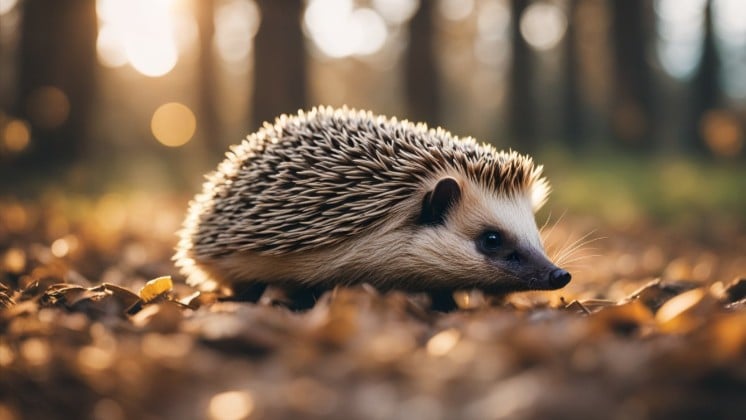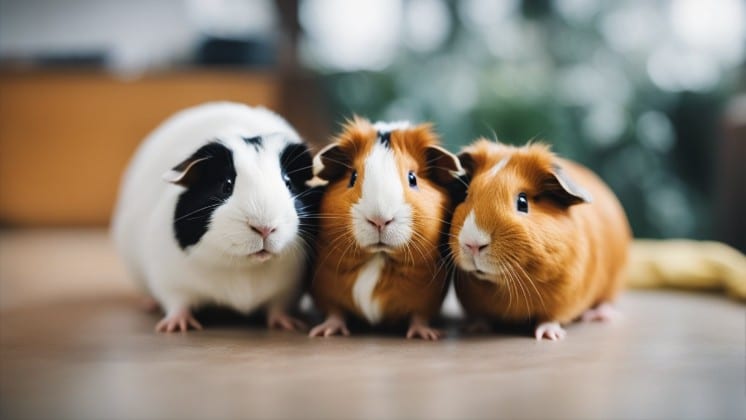Once considered the perfect easy and low-maintenance pet for young children, there’s now a growing understanding of how to properly care for guinea pigs. So, can you keep them outdoors, or can guinea pigs die from cold?
It’s possible for guinea pigs to thrive both when housed indoors and outdoors. However, if they are kept solely outdoors, you will need to ensure that they have plenty of insulation because guinea pigs can die from cold if you don’t take measures to keep them warm.
In this article, we’ll outline what temperatures are safe for guinea pigs and how you can house them and care for them to ensure they don’t get too cold. We’ll also explain what to do if you think your guinea pig might have gotten too cold.
What is the lowest temperature for guinea pigs?
- Guinea pigs should be kept at between 17 and 20 degrees Celsius (62.6 to 68F).
- The temperature should not be allowed to drop below 15 degrees Celsius (59F).
- Temperatures should not exceed 29 degrees Celsius (85F).
Can guinea pigs stay outside in the winter?
It’s a little controversial to leave your guinea pig outside in the winter due to fears of them getting too cold. However, if you have a pair or a herd of guinea pigs (which you ideally should), and you have provision for them to go into a well-insulated shed or hutch with plenty of bedding, it’s likely that they will be absolutely fine.
Guinea pigs should ideally be kept in pairs or as a herd, and they often snuggle together for warmth. To be safe, though, you must ensure that you keep a pet-safe thermometer in their hutch and monitor the temperature regularly if the outside temperature drops below 15 degrees Celsius.
If the temperature drops too low and you are unable to warm them sufficiently, you should move them inside to somewhere warm.
Are guinea pigs sensitive to cold?
Guinea pigs are very sensitive to the cold. As small critters, they lose heat more quickly than larger animals and humans.
If they get cold, they may not move as much, which can make them even colder, and they might not be able to access food and water. Guinea pigs are especially sensitive to cold if they are unwell, so it’s important to keep a close eye on your pig for any symptoms.
How do you keep guinea pigs warm outside?
If you choose to keep your guinea pigs outside, it’s really important to make sure they have access to an indoor area so that they don’t get too cold.
Monitor the temperature regularly, and add more straw, bedding, and an insulating cover (pet-safe and with ventilation) if needed. If, despite your efforts, the environment is less than 15 degrees, you should bring them to the warmth indoors.
Do guinea pigs get cold at night?
When the temperature drops at night, this is when guinea pigs are particularly susceptible to dying from cold. So, if you’re struggling to keep the temperature up in their hutch, consider bringing them indoors at night until the weather improves.
What happens when a guinea pig gets cold?
If your guinea pig gets too cold, you might notice the following:
- Their fur looks fluffed up, or they shiver.
- They find the warmest spot with the most bedding and stay there.
- If you have more than one guinea pig, they will huddle together.
- They will become lethargic and may not eat, drink, or behave normally.
- They may feel cool to the touch, weak, floppy, or drowsy.
- Hypothermia will develop and can lead to loss of consciousness, and they may die.
My guinea pig is cold and lethargic: What should I do?
If your guinea pig is not behaving normally, it’s always important to get them checked over by a vet, whether you think the cause is the cold or something else. If you think your piggy has gotten too cold and they are acting lethargic, you should:
1. Bring them indoors
You’ll be able to warm your guinea pig up more quickly indoors. Turn the central heating on and make sure the room is warm. If you have other guinea pigs too, you should also bring them inside.
2. Call the vet
Once your guinea pig is safely indoors, make a call to the veterinary clinic to arrange an urgent appointment. The vet will be able to give you any additional advice for your journey.
3. Use pet-safe heat sources
Blankets or towels, warm wheat bags, or pet-safe heat pads can be used to help your piggy feel cosier. You should make sure that whatever heat source you use is covered so as not to burn or injure your pet.
4. Monitor your guinea pig closely
As their body temperature increases, your guinea pig should become more alert and responsive and should start to move around a bit more. Offer them food and water once they are interested and can eat and drink safely.
Summary
Before we move on to the conclusion, we’ve summarized this article into a short list of key points for you to remember:
- Ensure your guinea pig has access to an indoor area.
- Monitor the temperature regularly and add more bedding if needed.
- Bring them indoors at night if the temperature drops below 15 degrees.
- If your guinea pig gets too cold, bring them inside and call the vet.
- Use pet-safe heat sources to help warm them up.
Conclusion
Caring for a guinea pig isn’t as easy as you might think – it’s not as simple as setting up a hutch and a run in the garden, giving them food and water, and cleaning their enclosure once a week! However, with the right guidance and an understanding of your guinea pig’s needs, you can enjoy the perfect furry companion.
So, if you decide a guinea pig could be your perfect pet, make sure you know how to keep them warm, spotting if they’re getting cold, and have provision to bring them indoors where it’s warm if the temperature drops too low.
Want to learn more about chinchillas?
Ready to boost your knowledge to the next level? If so, check out the articles below:
- Can Guinea Pigs and Hedgehogs Get Along? Read This First!
- 7 Reasons Why Guinea Pigs Are Aggressive (Explained)
- Guinea Pig Alternatives to Hay: 8 Things You Should Know





